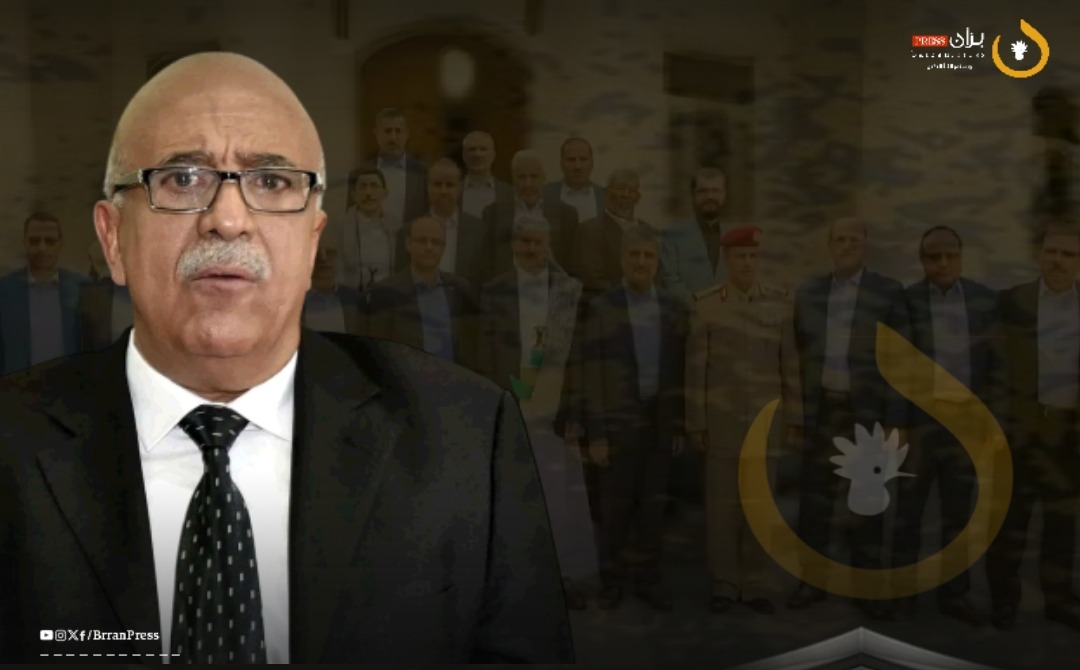
Barran Press - Monitoring Unit:
The Iranian-backed Houthi group, designated as a terrorist organization by several countries, announced the formation of its new (unrecognized) government on Saturday, August 10th, 2024. This comes after nearly 11 months since the dismissal of the previous coup government led by Abdul Aziz bin Habtoor, accused of corruption and subject to a list of radical changes.
The Houthi version of the Yemeni news agency Saba reported a decision issued by Mehdi al-Mashat, head of the so-called "Supreme Political Council" affiliated with the Houthis, appointing Ahmed Ghaleb Nasser al-Rahwi to form a government for the group in Sana'a (unrecognized), dubbed the "Government of Change and Construction."
While the new government, formed by al-Rahwi, a leading figure in the General People's Congress party and hailing from the southern governorates, has become a subject of criticism, mockery, and ridicule in social media posts and comments from Yemenis across political affiliations and backgrounds, it has also revealed how this government is perceived and at this particular time.
Houthi Lineage
"Barran Press" monitored some of these comments on social media, which addressed the Houthis' formation of their new government. Many saw it as a reflection of the group's lineage, with the majority of the government formation coming from the Hashemite families.
Former ambassador Abdul Nasser al-Mudde' stated, "Ali Abdullah Saleh's regime, considered corrupt, gradually placed relatives and those close to him in sensitive positions like the army and security over long periods. However, he rarely placed them in civilian positions."
He added in a Facebook post, "The power of the 'Satanic March' has allocated both large and small positions to the Hashemite in a blatant, ugly, and shameless manner."
Al-Mudde' continued, "More than half of the ministers in the 'Satanic Masirah' government have been allocated to the lineage "Hashemite ", despite the fact that ministers from outside the lineage are powerless and controlled by supervisors." He added, "There is boundless arrogance and audacity, which is a positive thing because it reveals the racist and ugly mentality of the 'Satanic Masirah,' which will contribute to its inevitable downfall soon."
Political activist Mohammed Mahdi wrote sarcastically, "The unrecognized 'louse' government is entirely from the lineage of Bani Hashim, in one of the forms of racism practiced by the Houthis in areas under their control."
He added, "By the way, Mohammed Muftah is the real prime minister of this government, and al-Rahwi is merely a facade. Those who don't know Mohammed Muftah, he is linked to Iranian intelligence, which supported his Iranian-backed Al-Ummah party. With Muftah's presence, the Houthis complete both their ideological and racist lineage identity."
The head of the General Authority for Books, Yahya al-Thalaiya, stated that two-thirds of the Houthi government formation is from "the lineage." Even international newspapers (referring to a report published by Al-Sharq Al-Awsat newspaper) have "become aware of the nature of the Yemeni people's problem with the 'sons of the Prophet' and the world is starting to differentiate between Houthi titles and positions based on the family tree they have crammed themselves into."
He added in his post, "Of course, this differentiation is the most important, while the legitimacy of their authority as a fait accompli is confined to the 'blue' and 'gray' (referring to supporters), even Dhahyan itself does not recognize Muftah, Qahhim, and al-Rahwi, and understands they are mere decorations."
Iranian Influence
Several Yemenis believe the Houthi government's formation and its appearance further solidify the group's allegiance to Iran. Political analyst Mohammed al-Masouri stated, "This government has sworn allegiance to Iran and has shown its loyalty and obedience to Iran from day one."
Addressing Houthi supporters, he asked, "What do you expect from them, you fools? A government that agreed to remove its neckties in imitation of the Iranian regime and its directives, do you consider it a Yemeni government?"
He continued, "It is an Iranian government, God and his creation are witness. The Houthis are Persian in everything."
Journalist Walid Jahzer echoed these sentiments, writing, "Without neckties, in the Iranian style, the latest fad of Tehran's slaves." He added, "Of course, they are not wrong, we deserve it. As our great poet al-Bardouni once said, 'And those who are commanded to the bones have Persian faces.'"
Similarly, media personality Mukhtar al-Faqih commented, "Wearing ties in the Iranian way is forbidden for ministers in the Houthi government. Those who control how you dress and force you to wear the clothes of your masters will control what they see as more important than that, even the freedom to dress, they do not possess."
Women Excluded, Houthi Hierarchy Exposed
Another point of contention for Yemeni influencers is the complete absence of women in al-Rahwi's government. Writer and political analyst Mustafa Naji commented, "There is not a single woman in the team." He added, "The formation reflects the group's perception of the hierarchical structure of society. We can call it a government of Hashimites and Sa'ada-ites, with the rest being mere decorations."
Naji believes the Houthis' selection of ministers from the southern governorates is not a sign of social unity, but rather an attempt to infiltrate certain southern governorates, particularly Abyan.
The new government's formation has not only sparked criticism and ridicule but also raised serious concerns about the Houthis' increasing reliance on Iran and their discriminatory practices. It remains to be seen how this new government will function and what impact it will have on the ongoing conflict in Yemen.
A Historical Perspective
Activist Mohammed Hajeb al-Qadi, in a recent article, analyzed the new Houthi government from several angles, focusing particularly on the historical context of the Imamate. He argues, "The Imamate has always infiltrated Yemeni society by exploiting conflicts between warring parties, enticing tribal leaders and feudal lords with positions and material gains, and persecuting opponents through destruction of homes, farms, and confiscation of property, as well as imprisonment, murder, and torture."
He further elaborated, "These three methods were established by Imam al-Hadi Yahya al-Rasi, who arrived in Yemen to establish an Alawite Islamic Caliphate and overthrow the Abbasid Caliphate."
Al-Qadi highlighted the intense conflicts and wars between tribes and their leaders at that time, including the Fatimids and the Akilis in Sa'ada, the Da'am, leader of the Bakil, and the Dhuhak, leader of the Hashid, the Al-Ya'fir and Bani Tarif in Sana'a, and Ali bin al-Fadl and Mansour bin al-Housh, leaders of the Ismaili movement.
He continued, "Despite these conflicts and wars between Yemenis, which Imam al-Hadi attempted to exploit, after 14 years of his arrival in Yemen, he died without managing to hold onto anything but Sa'ada and parts of Najran, after resorting to excessive force against his opponents, destroying entire homes and villages, ruining the farms of his opponents, cutting down their palm trees, and sending the heads of his opponents to Najran to suppress any opposition to him, clinging to his remaining dreams in Sa'ada and Najran."
Al-Qadi stated, "Yemenis, by nature, have always been independent. They cannot accept someone who comes to them with a theory of selection and proclaims, 'I am better than you.' Therefore, the people of Sana'a, after the arrival of Imam al-Hadi, protested against him, chanting, 'We will not be ruled by an Alawite.' Whenever Imam al-Hadi entered Sana'a, exploiting the conflicts between the leaders at that time and winning over one against the other to reach Sana'a, they expelled him. He eventually became discouraged, and his dreams of establishing an Alawite state in Yemen were shattered until he died poisoned in his home in Sa'ada."
He continued, "His sons and grandsons followed in his footsteps, as did many Imams from other families, all following the same path. However, their Alawite state, which they sought to establish in Yemen and from there to the entire Arab and Islamic world, never materialized in the face of the strength and resilience of the Yemenis."
A Familiar Pattern
Al-Qadi concludes his article by stating, "What the Imams failed to achieve in a thousand and one hundred years will not be achieved by Abdul-Malik al-Houthi today, even if he exploits the conflicts and struggles of the Yemenis among themselves. However, the Yemenis will quickly come together to overthrow the Imam, even if he establishes himself for a short period. His end is inevitable at the hands of the Yemenis."
He stated, "What Imam al-Hadi Yahya al-Rasi failed to achieve, Abdul-Malik al-Houthi will not achieve, and history bears witness to this. Abdul-Malik al-Houthi is following the same path as his ancestors in subjugating the Yemenis, and we are following the same path as our ancestors in our independence and rejection of the superiority over the Yemenis based on lineage and the alleged divine right. Under the same circumstances that our ancestors were freed from their Imams, we will also be freed from Abdul-Malik al-Houthi, and history will repeat itself."
The formation of the new Houthi government has not only sparked criticism and ridicule but also triggered a deeper analysis of the Houthi's intentions, drawing parallels to the historical rule of the Imams in Yemen. This analysis highlights the potential for a renewed struggle for independence and the rejection of any attempt to impose an authoritarian regime on the Yemeni people.





